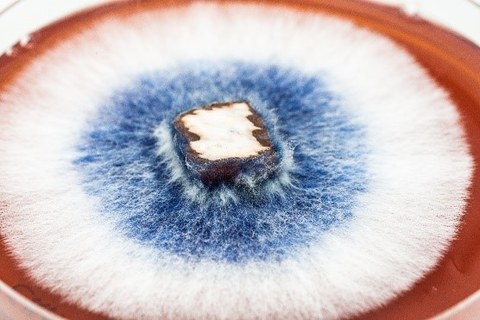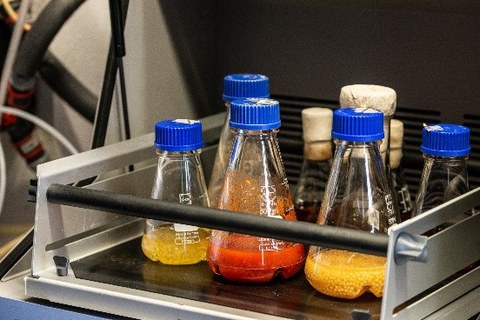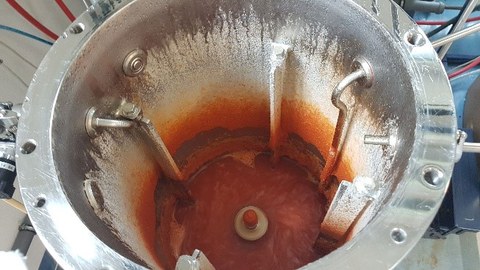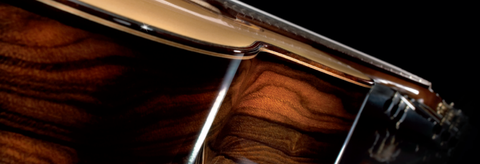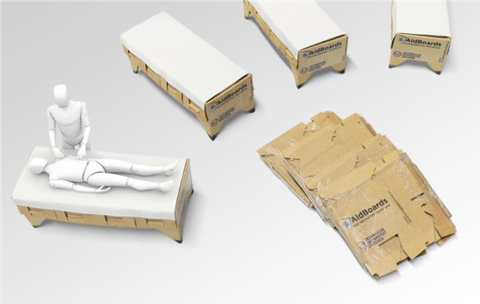Materials that dreams are made of
Mushrooms - natural and biodegradable dyes
The textile industry produces high water pollution from synthetic, poorly degradable dyes. Compared to petroleum-based shades, some of which are harmful to health, natural and biodegradable dyes are attractive alternatives for the bio-economy. Countless representatives in fungi - specifically the basidiomycetes (stander fungi) - are known as dye formers and were used for dyeing in the past.
A significant advantage of the metabolism of fungi is the use of lignocellulose-based agricultural residue streams (wood chips, bran, potato peels) as substrates to obtain valuable products from waste materials by means of cultivation in bioreactors. At the Chair of Bioprocess Engineering, we optimize the production of biodegradable natural dyes using fungi.
The dyes are used in the textile industry and cosmetic products. By working on these projects, our students learn how fermentation processes are optimally managed, and products are gently purified.
iBauM
The Chair of Wood Technology and Fiber Materials Engineering has developed a process that prepares domestic woods for use in guitar construction, thus making their production independent of the import of protected tropical woods. This technology will enable domestic musical instrument makers to find alternatives for previously used tropical woods with their special sound properties and thus comply with the stricter regulations on trade in tropical woods that have been in force since 2017.
In order to achieve the desired properties, native woods were subjected to targeted thermal treatment, and individual samples and entire instruments were tested for strength, sorption, acoustics, and color. In the meantime, our industry partner has a collection of tropical wood-free concert guitars on offer.
BioBind
With BioBind, the Chair of Wood Technology and Fiber Materials Technology has developed a bio-based system for combating oil spills in cooperation with the University of Rostock, among others. The beer-cap-sized oil binders, based on wood fibers, seaweed, and agricultural residues, are suitable for removing oil spills on bodies of water such as seas, rivers, and inland waters. They can be deployed by air, helicopter or ship, even in bad weather, to combat oil spills caused by shipping, for example. They are then recovered with net barriers. They can directly degrade the collected oil by applying biofilms of oil-degrading bacteria combined with algae. This colonization places great demands on the material, which must also remain buoyant for a long time while absorbing as much oil as possible. By successfully overcoming these challenges, the transfer to mass production and thus practice can begin.
Aidbords
In the event of disasters in which people leave their homes, housing them is a significant challenge, e.g., Camp beds are of central importance for humanitarian aid to offer refugees and evacuees a place to arrive. For this purpose, large quantities of products are used that must be available very cheaply. As soon as the auxiliary assignment is completed, the disposal of this equipment is a problem that the Chair of Wood Technology and Fiber Material Technology solves by developing disposable furniture made from renewable raw materials. The resulting products use the heavy-duty corrugated board as the material. This makes them light and cost-effective; they can be produced quickly in the event of a disaster and are then mainly valuable waste paper, perfect for recycling. In this special application, AidBoards are therefore more sustainable as disposable items than a folding cot that is more durable at first glance. This is made of metal and plastic, is laboriously imported from the Far East, and must be disposed of after its short use, only with much greater effort. In addition to camp beds, several articles are specially designed for emergency accommodation and were brought to market as a startup in cooperation with the DRK 2022.

